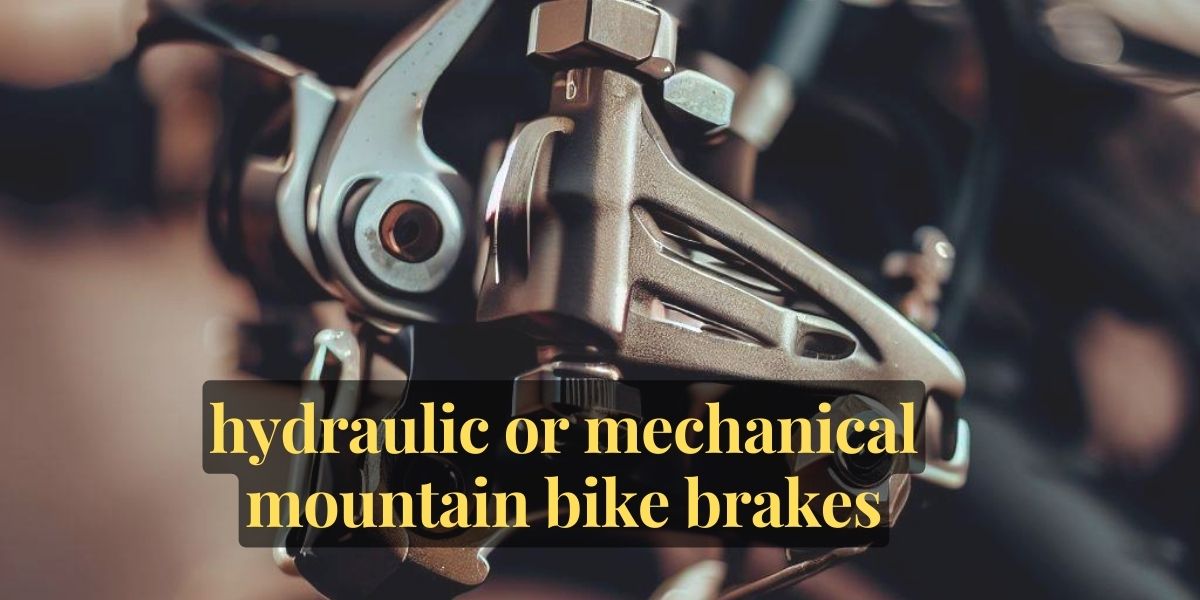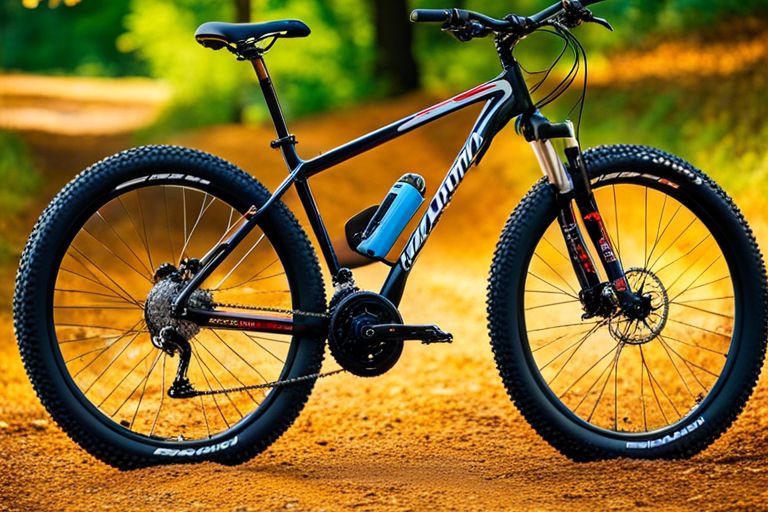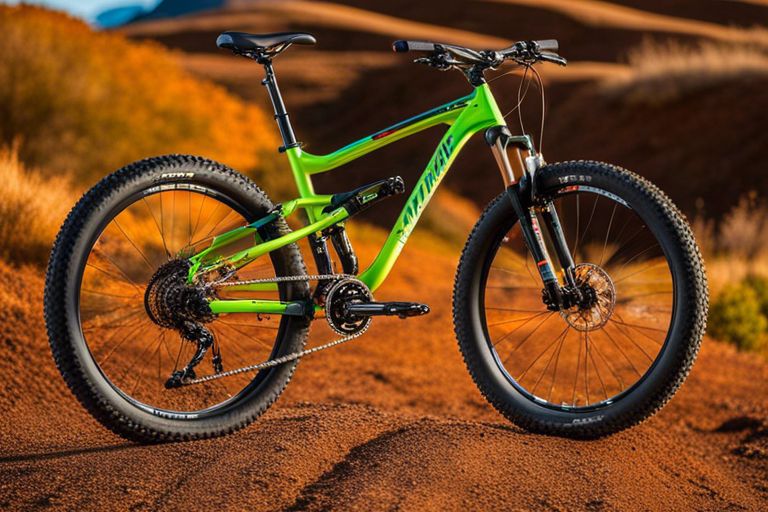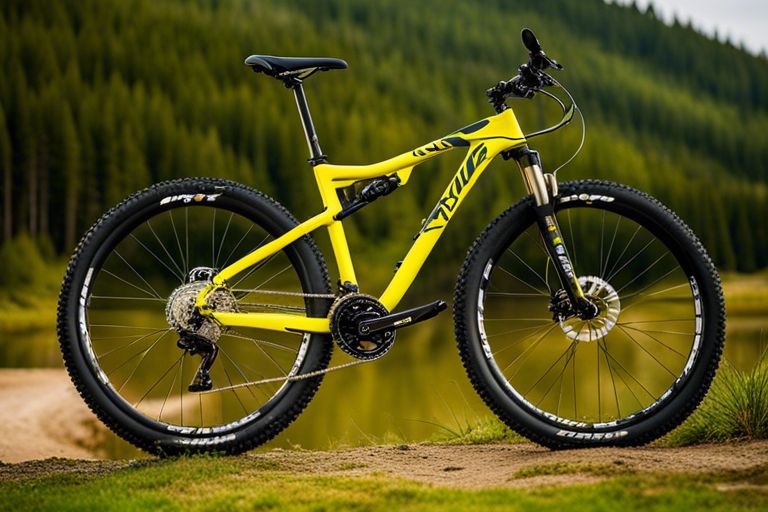Mountain biking is an exciting and challenging sport requiring much skill and practice to master. One of the essential components of a mountain bike is its braking system.
The brakes on a mountain bike need to be powerful and responsive to allow the rider to stop quickly and safely on the varied terrains of the mountainside.
For beginners, selecting the right type of brakes can be overwhelming, considering the many options available on the market.
Many riders wonder if hydraulic or mechanical mountain bike brakes are better for beginners. In this blog post, we will answer this question to help you make an informed decision when choosing mountain bike brakes.
The context above is essential because selecting the right brakes for your mountain bike can significantly affect your bike’s overall performance and safety.
With the variety of brake options, selecting the right type of brake can be overwhelming, especially for beginners. Hydraulic and mechanical brakes are the two main options, and it is essential to understand the differences between them to choose the ideal option for your riding style and skill level.
By understanding the pros and cons of hydraulic and mechanical brakes, you can make an informed decision to enhance your comfort, confidence, and safety while mountain biking.
Table of contents
Contents
- 1 Tip 1: Consider hydraulic mountain bike brakes as they offer better braking performance and require less hand effort to operate.
- 2 Tip 2: Mechanical brakes may work better for beginners who want to save on cost, as they are less expensive than hydraulic brakes.
- 3 Tip 3: Hydraulic brakes require less maintenance than mechanical brakes, making them a better choice for riders unfamiliar with bike maintenance.
- 4 Conclusion 💭
- 5 You may also like 📖
Tip 1: Consider hydraulic mountain bike brakes as they offer better braking performance and require less hand effort to operate.
Mountain biking is among the most thrilling and exhilarating activities many people enjoy. As you navigate through rough terrains, slopes, and corners at high speeds, nothing is more important than relying on your bike’s brakes.
If you’re an enthusiastic mountain biker looking to upgrade your bike’s performance, then one essential feature to consider is hydraulic brakes.
Tip 1: Consider hydraulic mountain bike brakes as they offer better braking performance and require less hand effort to operate.
Hydraulic brakes use fluid to transmit the force from the brake lever to the caliper, which clamps down on the rotor to stop the wheel.
Compared to traditional mechanical brakes, hydraulic brakes offer better modulation, requiring less hand pressure and offering greater control over stopping power. This means you can stop more quickly and with greater accuracy, all while using less energy and effort.
If you’re thinking of upgrading to hydraulic brakes, here are some tips to keep in mind:
Look for compatible brakes:
Hydraulic brakes come in different styles and sizes, so choose the right ones that fit your bike’s frame and wheel size.
Leave it to a professional:
Installing hydraulic brakes can be tricky and, if not done correctly, can lead to brake failure while riding. Consider having a professional bike mechanic do the installation for you.
Test your brakes:
Before heading out on any ride, take the time to test them and ensure that they are in good working condition. Check that the pads make good contact with the rotor and that the lines have no air.
Maintain them regularly:
To keep your hydraulic brakes in top condition, ensure you bleed the system periodically, check the brake pads, and replace them when necessary.
If you want to take your mountain biking experience to the next level, upgrading to hydraulic brakes is wise. With better braking performance and less hand effort required to operate, you’ll be able to ride faster, with greater control and confidence. Follow these tips and tricks to ensure you get the most out of your new hydraulic brakes.
See also: 9 Best Mountain Bikes Hydraulic Brakes
Tip 2: Mechanical brakes may work better for beginners who want to save on cost, as they are less expensive than hydraulic brakes.
When you’re just starting in the world of cycling and bike maintenance, it can be easy to get overwhelmed by the wealth of options and technical jargon that seems to abound everywhere you turn. And when it comes to the topic of brakes, the choices are no less daunting.
That’s why we’ve put together this brief guide to one of the most commonly asked questions about brakes: Mechanical or Hydraulic?
In general, mechanical brakes tend to be less expensive than hydraulic brakes. Hydraulic brakes require more complex components like brake fluid and hydraulic lines.
Opting for mechanical brakes might be a good idea if you’re a beginner who doesn’t want to spend too much on your bike and its components.
However, it’s important to note that mechanical brakes may not perform quite as well as hydraulic brakes when it comes to stopping power.
Hydraulic brakes are generally more powerful and responsive and require less effort. Additionally, mechanical brakes may be less consistent, as their cables and housing may stretch over time and need adjustments.
So how do you decide what type of brake to get? Here are a few tips and things to consider:
Tip 1:
Consider your budget. If you’re on a tight budget and want to keep costs down, mechanical brakes may be a good choice. But remember that you may sacrifice some performance in exchange for cost savings.
Tip 2:
Think about how you’ll use your bike. If you plan on doing a lot of off-road or mountain biking, hydraulic brakes may be a better choice due to their greater stopping power and reliability.
Tip 3:
Consider your skill level. If you’re a beginner or relatively new to cycling, mechanical brakes might be a better choice since they are easier to maintain and adjust. As you become more experienced, you may want to switch to hydraulic brakes for better performance.
Ultimately, it’s important to choose the brakes that work best for your needs, skill level, and budget. Whether you opt for mechanical or hydraulic brakes, keep up with regular maintenance and adjustments to ensure the best possible performance and safety.
Tip 3: Hydraulic brakes require less maintenance than mechanical brakes, making them a better choice for riders unfamiliar with bike maintenance.
Hydraulic brakes have been around for quite some time in the cycling industry and continue to rise in popularity due to their reliability and safety features. Hydraulic brakes require less maintenance than mechanical ones, making them an excellent choice for riders unfamiliar with bike maintenance.
Here are some key factors that make Hydraulic brakes a better choice:
- Self-Adjustment: Hydraulic brakes are much easier to adjust than mechanical brakes because they have a self-adjusting feature that eliminates manual adjustments.
- Braking power: Hydraulic brakes use hydraulic fluid and a piston to create braking power. The hydraulic fluid is much denser than air and provides a superior level of braking power that is impossible to achieve with a mechanical brake.
- Clean and Durable: Hydraulic brakes are not exposed to the harsh elements that mechanical brakes have to endure, like dirt and debris. Therefore, they stay cleaner for longer and last longer.
- Consistency: Hydraulic brakes provide consistent braking power, making them ideal for riders who frequently ride in varying terrain and weather conditions.
- Low Maintenance: Hydraulic brakes require minimal maintenance due to their self-adjustment and durable build. A yearly check-up is all that is typically needed to maintain peak performance.
- Compared to mechanical brakes, hydraulic brakes have proven to be safer and more reliable for cyclists of all levels. Due to the above-mentioned factors, riders unfamiliar with bike maintenance should consider investing in a hydraulic brake system for a more relaxed and enjoyable riding experience.
Conclusion 💭
Both hydraulic and mechanical mountain bike brakes have their benefits and drawbacks. If you’re a beginner looking for better braking performance with less hand effort, hydraulic brakes may be the way to go.
However, if you’re on a tight budget, mechanical brakes are a more affordable option. Additionally, if you don’t want to spend too much time on maintenance, hydraulic brakes may be a better choice as they require little upkeep.
Ultimately, the decision between hydraulic and mechanical brakes comes from personal preferences and circumstances. Regardless of your choice, the most important thing is to ensure that your brakes are properly maintained and in good condition for a safe and enjoyable ride.
Considering these tips before purchasing, you can make an informed decision and improve your mountain biking experience.
You may also like 📖
The 15 Best Schwinn Mountain Bikes for All Trails: Expert Reviews & Buying Guide
The Best Mountain Bikes For Beginners In 2023: 10 Outstanding Picks
10 Best Mountain Bikes For Wheelies In 2023 (Buyer’s Guide)
Schwinn Traxion Mens and Womens Mountain Bike review
Mongoose Impasse Adult Men Women Mountain Bike Review
HEAD UP2 L-Twoo A7 Alloy Dual Suspension Mountain Bike review






